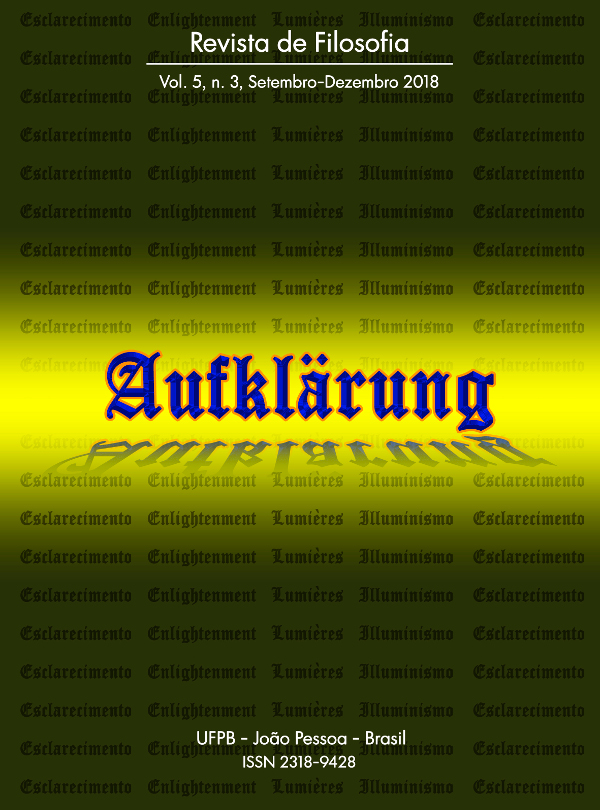Is petitio principii a petitio principii?
DOI:
https://doi.org/10.18012/arf.2016.40801Palavras-chave:
Question begging, circularity, illocutionary logic, speech acts, fallaciesResumo
In this contribution we focus on the petitio principii fallacy and we review it under the tenets of different typical treatments. Then we submit the claim that petitio principii is indeed fallacious, not because of circularity—as the typical treatments suggest—, but because it fails to follow an order relation in Searle and Vanderveken's illocutionary logic. In other words, we claim that, although petitio principii arguments appear to be circular with respect to their propositional content, they are not circular with respect to their illocutionary acts. And hence, even when petitio principii arguments look like propositional loops and instances of reflexivity, they actually constitute a failure in an order relation, a non sequitur as it were.Downloads
Referências
AUSTIN, John Langshaw. How to do things with words. Cambridge: Harvard University Press, 1962.
BEGGING THE QUESTION. (2018, June 25). Retrieved June 30, 2018, from https://en.wikipedia.org/wiki/Begging_the_question#Definition.
BEGGING THE QUESTION. (n.d.) Retrieved June 30, 2018, from http://www.fallacyfiles.org/begquest.html.
COHEN, Morris Raphael & NAGEL, Ernest. An introduction to logic and the scientific method. New York: Harcourt, Brace, 1934.
COPI, Irving M. & COHEN, Carl. Introduction to logic. New York: Macmillan, 1990.
HANSEN, Hans Vilhelm. “The Straw Thing of Fallacy Theory: The Standard Definition of 'Fallacy'”. Argumentation, 16(2), 133-55, 2002. Doi:10.1023/A:1015509401631.
IKUENOBE, Polycarp. “In Search of Criteria for ‘Fallacies’ and ‘Begging the Question’”. Argumentation, 16(4), 421-441, 2002. Doi:10.1023/A:1021158632437.
PETITIO PRINCIPII. (n.d.) Retrieved June 30, 2018, from http://philosophy.lander.edu/logic/circular.html.
RITOLA, Juho. “Begging the question: a case study”. Argumentation, 17(1), 1-19, 2003. Doi:10.1023/a:1022908405402.
RITOLA, Juho. “Justified and Justifiable Beliefs: The Case of Question-Begging”. Philosophical Studies, 128(3), 565-83, 2006. Doi:10.1007/s11098-004-7822-1.
SIEGWART, Geo. “Alethic acts and alethiological reflection. An outline of a constructive philosophy of truth”. In Greimann D. and Siegwart G. (Eds.). Truth and speech acts: studies in the philosophy of language (pp. 41-58). New York: Routledge, 2007.
SEARLE, John R. Speech acts: an essay in the philosophy of language. London: Cambridge University Press, 1969.
SEARLE, John R. & VANDERVEKEN, Daniel. Foundations of illocutionary logic. Cambridge: Cambridge University Press, 1985.
SGARAVATTI, Daniele. “Petitio Principii: A Bad Form of Reasoning”. Mind, 487, 749-79, 2013. Doi:10.1093/mind/fzt086.
SUBER, Peter. “Question-begging under a non-foundational model of argument”. Argumentation, 8(3), 241-50, 1994. Doi:10.1007/bf00711191.
TRUNCELLITO, David A. “Running in Circles about Begging the Question”. Argumentation, 18(3), 325-29, 2004. Doi:10.1023/b:argu.0000046731.07528.75.
VAN EEMEREN, Frans H. & GROOTENDORST Rob. “The pragma-dialectical approach to fallacies”. In Hansen, H.V. and Pinto R. (Eds.). Fallacies: classical and contemporary readings (pp. 130-144). Pennsylvania: Pennsylvania State University Press, 1995.
WALTON, Douglas. “Begging the question as a pragmatic fallacy.” Synthese, 100(1), 95-131, 2004. Doi:10.1007/bf01063922.
WRIGHT, Crispin. “(Anti-)Sceptics Simple and Subtle: G.E. Moore and John McDowell”. Philosophy and Phenomenological Research, 65 (2), 330-48, 2002. Doi:10.1111/j.1933-1592.2002.tb00205.x.
Arquivos adicionais
Publicado
Como Citar
Edição
Seção
Licença
Política de Direito Autoral para os itens publicados pela Revista:
1.Esta revista é regida por uma Licença da Creative Commons aplicada a revistas eletrônicas. Esta licença pode ser lida no link a seguir: Creative Commons Attribution 4.0 International (CC BY 4.0).
2.Consonante a essa politica, a revista declara que os autores são os detentores do copyright de seus artigos sem restrição, e podem depositar o pós-print de seus artigos em qualquer repositório ou site.
Política de Direito de Uso dos Metadados para informações contidas nos itens do repositório
1. Qualquer pessoa e/ou empresa pode acessar os metadados dos itens publicados gratuitamente e a qulquer tempo.
2.Os metadados podem ser usados sem licença prévia em qualquer meio, mesmo comercialmente, desde que seja oferecido um link para o OAI Identifier ou para o artigo que ele desceve, sob os termos da licença CC BY aplicada à revista.
Os autores que têm seus trabalhos publicados concordam que com todas as declarações e normas da Revista e assumem inteira responsabilidade pelas informações prestadas e ideias veiculadas em seus artigos, em conformidade com a Política de Boas Práticas da Revista.






































